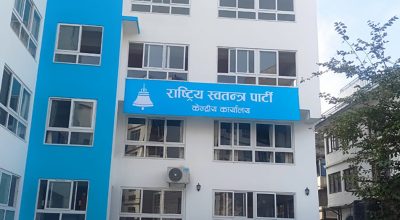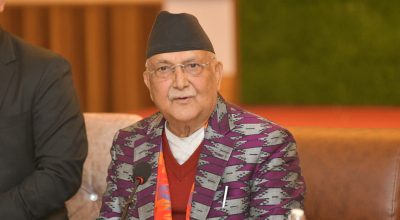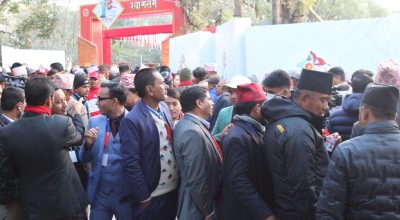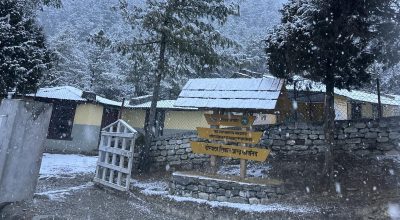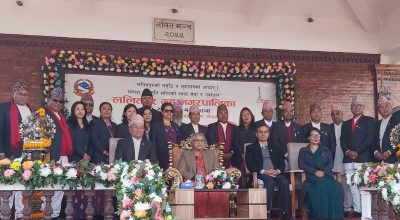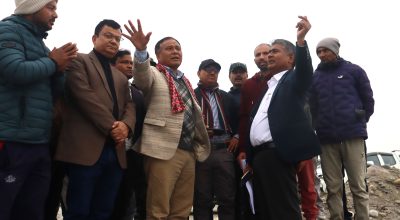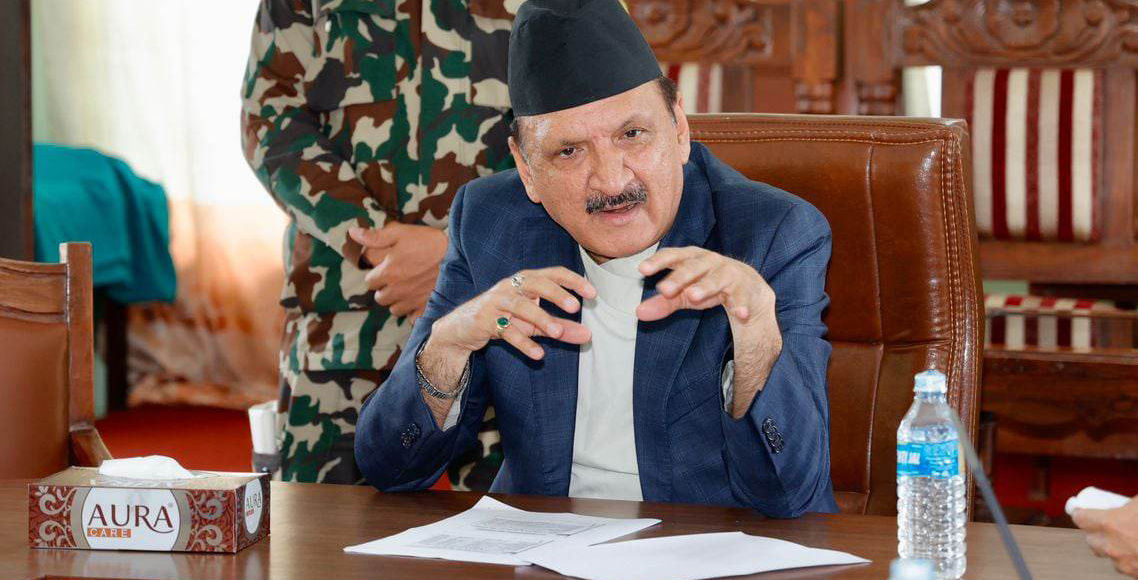
Kathmandu, July 11: The government’s estimates of income and expenditures for the upcoming fiscal year 2023-24 that was brought on May 29 has been already endorsed by the House of Representatives (HoR) while deliberations over it are underway in the National Assembly (NA). Meantime, the Nepal Rastra Bank (NRB) has been preparing to bring the Monetary Policy which is considered to be compatible with the government’s fiscal policy for the next fiscal soon.
Amidst all these, RSS correspondents Bhishma Raj Ojha and Hemanta Joshi had a tete-a-tete with Finance Minister Dr Prakash Sharan Mahat to archive the government’s opinions about the overall economic scenario, preparedness for the budget implementation, the upcoming monetary policy and so on. Following are the edited excerpts from the same interview:
How do you assess the existing overall economic scenario at home?
The economy is oriented towards the path of reform. The forex reserves have increased compared to the previous year. We experience a recovery in tourism industry. Bank interest rates are likely to fall. The Nepal Rastra Bank is expected to take some measures aiming to strengthen the economy through the new monetary policy. We expect once the bank interest rates reduce, loan disbursement from banks and finances will increase, leading to an economic acceleration. On the other hand, we have prioritised the needs to increase capital expenditures and its efficiency in the budget. We will leave no stone unturned to implement it. We have plans to discourage the trend of promoting expenditures in the eleventh hour of the fiscal year.
The rise in capital expenditures and the loan investment by banks and financial sector is expected to encourage the private sector for a better performance, contributing to address the economic slowdown. Economic activities will soar, helping revive the scale of revenue collections. The new tax provisions incorporated in the budget are expected to helpful in addressing the issues in revenue collection. We make efforts to bring many enterprises into the tax network through the extended tax system. The VAT provisions will also contribute to promote the revenue collection. Being based on all these things, the government hopes to find an encouraging atmosphere for the nation’s economy.
Improvement is needed in the State’s expenditure structure. Proper needs assessment, selection of priorities, source reliability, sustainability and sufficiency and the expenditures accordingly are needed for better results. We promise to address these things in the upcoming budget.
The government claims that the upcoming budget incorporates budget reform programmes and for reform in the expenditure system. Do we not have any ground to launch the measures for reform within the current fiscal year?
We hear about alleged reports about the budget spend and the increased budget transfers in the final months of the fiscal year and violation of the fiscal discipline.
It is quite challenging to begin multiple initiations within the current fiscal year. It was just around two months that I took charge of the Ministry when the budget announcement took place. Some budget-related procedures were already in the progress. It had a very limited time to go for new plans, targeting the economic reforms. The situation prevents us from starting many things within the current fiscal. So we hope to make it all happen through the implementation of the upcoming budget
Private sector serves as a vital pillar of economy. How does the government cooperate and coordinate with the private sector for economic progress?
The government pursues the policy of promoting the private sector and the budget plans and programmes have been formulated accordingly. The role of the government is to regulate, promote and facilitate the private sector and to build an atmosphere for a healthy competitive market. Through the budget, the government unveils its plan of protecting domestic productions. Private sector welcomes the overall provisions in the budget positively. But still, some ‘privileged’ groups and community may be unhappy by the budget. We aim to achieve collective benefits instead of granting privileges to a specific population.
The private sector has been complaining that there is adverse impact in business due to decrease on market demand and purchasing power of customers. What kind of budget has been brought in order to give relief to general people during the economic crisis?
We had to go through serious condition due to COVID-19 pandemic. Obviously, there is some pressure in economy due to this. It does not mean that the purchasing power has decreased too much. The impact on financial sector was seen after the loose monetary policy brought during the COVID-10 pandemic was tightened all of sudden. Cost of the investment has increased due to rise in interest rate. Overall demand has decreased due to increase in cost of investment. This situation has surfaced due to the message that country’s economy is in negative state. I think the overall economy will move ahead in a positive way.
There are challenges in implementation of budget despite good plans and programmes for reforms of economy. Our experiences from the past also show there is challenge in implementation. What types of challenges you have seen in implementation of budget of coming fiscal year?
The challenge is our overall state mechanism. We all should be serious and responsible towards our duties. Our main challenge is that the state has less resources and less spending capacity. So the main thing is how to make the programmes more result-oriented which makes the state bodies to be serious in the use of resources. We have taken the problems of overall structures seriously. We have been committing that we will implement the budget as determined in the schedule. Cooperation and coordination of all bodies concerned is necessary for its implementation.
Questions are being raised in the parliament that the central government allocated the budget for small-scale projects in order to weaken the federalism by misusing power. What do you say about it?
It is true that the small-size budget was allocated for some projects. I could not completely stop it this time despite efforts. I accept it. We have clearly put these things in the parliament and the parliament has taken it seriously. I think bureaucracy has also started taking it seriously. It was only a stunt that more budget was allocated in constituencies of powerful leaders. It is not true. Currently, resources are less. So less amount of budget was allocated.
Some expenditure reduction and austerity-related programmes have also been included in the budget for the upcoming fiscal year. It is stated that some government entities would be dissolved while some would be merged with others. How is this going to be implemented?
Public Expenditure Review Commission formed under the convenorship of Dilli Raj Khanal has recommended that 200 government bodies are not required. We were not in a position to implement the recommendations in toto and in a hurry without studying the whole scenario. Therefore, we proposed dissolution or merger of a small number of government corporations and bodies. In this also, many questions came up especially with regards to merging the District Election Office with the District Administration Office. It is not that we wanted to do away with the Election Office, but the intention was to keep the District Election Office at the District Administration Office itself. The idea was to keep the District Election Office under the District Administration Office as the latter had works to do one time in five years and did not have much to do at other times. This proposal had not been made with any ulterior motive or thinking. It was proposed with the intention that the expenditure could be cut. However, it was interpreted in a different way. Now we have already decided that we will not touch the District Election Office.
Questions are also raised regarding the budget size and the sources the government has indicated for bearing the obligations of such expenditure. The government revenue collection is too small compared to the target. Loans and grants have also not been raised as per the target. On the other hand, the room for mobilizing loans to the private sector is also limited when the government raises large amount of internal loans. How are you going to address these problems?
There is no basis for us to ask for additional assistance from the donor agencies because we have not been able to spend much. Why? It’s because we could not spend. Because of this we have proposed in the budget a change in the expenditure modality. It helps to increase the budget expenditure when works are moved ahead only by removing obstacles like the construction sites not cleared on time, contracts not signed on time and issues related to compensation and clearance of the right of way in forest. Additional commitment for assistance will be forthcoming in the coming year when we increase our expenditure capacity. We need to increase our expenditure capacity for that.
Talking of internal loans, we have proposed to raise less amount in loans for the coming fiscal year as compared to the current fiscal year. We have reduced the internal loan thinking that the higher the internal loans the government raises, less is the loan going to the private sector. Nevertheless, the obligation in terms of the principal and interest on loans is growing.
This is likely to increase more next year. We have the service the loans that we have taken and we have a good track record on this. It is not that we have not paid the installment of loans to be paid. We have created a credible environment before the development partners on the payment of the principal amount and interest.
There is criticism that large chunk of the budget has been allocated under the Economy Miscellaneous heading. What have you to say on this?
The budget under the Miscellaneous heading has been kept as per the principle of necessity. Several situations might arise at different times. At such times, we cannot sit idle doing nothing citing lack of resources. The budget under this heading will be spending where it is needed.
It is suspected that the government will have difficulty mobilizing budget with the Parliament failing to pass the Appropriation Bill on time. What do you say on this?
Such a situation will not arise. The budget has been passed by the House of Representatives. It is under discussion in the National Assembly. This will also be concluded.
All attention is now focused on the Monetary Policy. What kind of Monetary Policy should be brought to achieve the budget targets?
We need a flexible monetary policy than the present one. It has been generally made flexible before this as well. But it is not enough. Therefore, I have clearly told the Nepal Rastra Bank leadership that the monetary policy has to be made flexible. We can achieve the target of 6 percent economic growth rate if the Fiscal Policy and the Monetary Policy worked in a harmonized way. The Monetary Policy has important role to play in achieving the targeted economic growth rate and in managing the overall economy.
Higher interest rate on loans means problems have come in making the economy vibrant. Therefore, it is necessary to bring some flexible provisions through the Monetary Policy.
Have you anything more to say at the end?
The budget allocation has to be made on the basis of our expenditure modality and how much resources we have in order to bring the overall economy into discipline. The budgetary allocations have to be judicious and not scattered. There are problems in the internal structures. It is necessary to improve these and the budget has proposed for this reform. Our needs are unlimited, but we have limited resources. The dissatisfactions over and the criticism of the budget are nothing but comments resulting for the gap between our needs and the limited sources.







